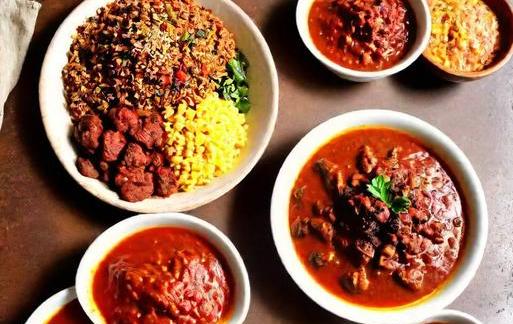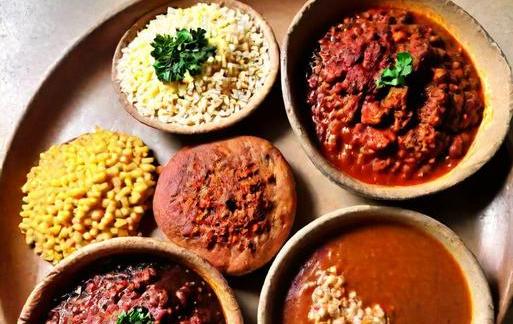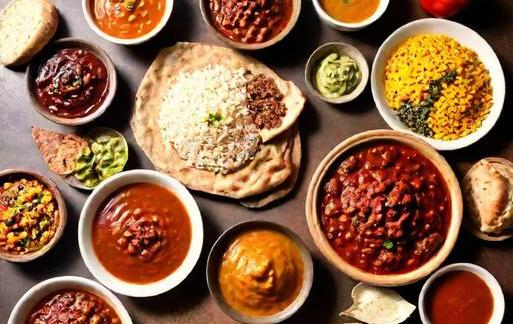- You are here:
- Home »
- Food
- » [REVEALED] African Foods That Start With Z
[REVEALED] African Foods That Start With Z
Note: This page contains affiliate links.
As an Amazon Associate, I earn from qualifying purchases when you click on the link, but you are not charged extra.
Africa is a continent rich in diversity, not only in its landscapes and cultures but also in its cuisine. From savory stews to exotic fruits, African food represents a tapestry of flavors that reflect the continent’s vastness. In this gastronomic journey, we will delve into a specific category – African foods that start with the letter Z. While it may seem like a challenging task, the culinary traditions of Africa offer an array of delectable options that start with this unique letter.
Contents
List Of African Foods That Start With Z

1. Zambezi Mango
The Zambezi Mango, scientifically known as Irvingia Smithii, is a tropical fruit native to the Zambezi River region. This mango variant is renowned for its distinctive sweet taste and vibrant orange flesh. The Zambezi Mango is not only consumed fresh but is also used in various culinary applications, such as chutneys, desserts, and refreshing beverages. Its versatility makes it a prized ingredient in both traditional and modern African cooking.
2. Zebra Meat
While not as commonly consumed as other meats, zebra meat holds a special place in African culinary traditions. Found in certain regions of Africa, zebra meat is known for its lean texture and unique flavor profile. It is often prepared using traditional cooking methods, such as slow roasting or braising, to enhance its tenderness. Zebra meat is a delicacy that showcases the diverse range of proteins enjoyed in African cuisine.
3. Za’atar Spice Blend
Originating from North Africa, Za’atar is a versatile spice blend that often includes ingredients like thyme, sesame seeds, sumac, and salt. While its name doesn’t start with Z, the blend itself is a crucial part of many African dishes, adding depth and fragrance. Commonly used to season meats, vegetables, and bread, Za’atar contributes a unique and aromatic flavor to African culinary creations.
4. Zambezi Bream
The Zambezi Bream, also known as Tilapia rendalli or the red-breasted tilapia, is a freshwater fish found in the Zambezi River and other water bodies across Africa. This fish is a popular choice in African cuisine, celebrated for its mild flavor and tender flesh. Whether grilled, fried, or stewed, Zambezi Bream is a versatile ingredient that adds a delightful aquatic element to various traditional African dishes.
5. Ziziphus Mauritiana (Ber)
Ziziphus Mauritiana, commonly known as Ber or Indian Jujube, is a small fruit-bearing tree native to Africa. The fruit, often referred to as Ber, is enjoyed both fresh and dried. In African cuisines, it is used to make jams, preserves, and beverages. The slightly tart flavor of Ber adds a unique twist to desserts and sauces, making it a sought-after ingredient in the culinary landscape.
6. Zebu Meat
Zebu, a species of cattle found in various African regions, provides meat that is a staple in many traditional dishes. The meat is known for its lean quality and rich flavor, making it a preferred choice for stews, grilling, and roasting. Zebu meat is often marinated with local herbs and spices, showcasing the vibrant and diverse tastes that characterize African cooking.
7. Zimbabwean Pumpkin Stew
Pumpkins are a versatile ingredient used in various African cuisines, and Zimbabwean Pumpkin Stew is a standout dish that highlights the culinary prowess of the region. This hearty stew combines chunks of pumpkin with a flavorful broth made from a blend of spices, herbs, and sometimes meat. The result is a comforting and nutritious dish that reflects the agricultural abundance of Zimbabwe.
8. Zobo Drink
Zobo, also known as Sorrel Drink, is a popular beverage in several African countries. The drink is made from dried hibiscus petals, giving it a deep red color and a tart flavor. Often sweetened with sugar and flavored with spices like ginger or cloves, Zobo is a refreshing and vibrant drink enjoyed on various occasions. Its popularity extends beyond Africa, with its unique taste captivating people around the globe.
9. Zitenga Sauce
Zitenga Sauce, originating from Burkina Faso, is a spicy and flavorful condiment that adds a kick to numerous dishes. Made from a combination of chili peppers, onions, tomatoes, and various spices, this sauce is a staple in Burkina Faso’s culinary repertoire. Whether used as a marinade, dipping sauce, or accompaniment to grilled meats, Zitenga Sauce exemplifies the bold and dynamic flavors found in African cuisine.
10. Zambian Butter Bread
Zambian Butter Bread is a delightful baked good that graces tables across Zambia. This bread is known for its rich, buttery flavor and soft texture. It is often served as a side dish to complement savory stews, soups, or enjoyed on its own. The simplicity of Zambian Butter Bread belies its importance in the daily culinary rituals of the Zambian people.
Exploring African foods that start with the letter Z unveils a fascinating culinary world rooted in tradition and innovation. From the exotic Zambezi Mango to the savory Zebra Meat, each ingredient contributes to the rich tapestry of flavors that define African cuisine. Whether enjoying a bowl of Zimbabwean Pumpkin Stew or sipping on the vibrant Zobo Drink, the diverse culinary landscape of Africa continues to captivate the taste buds of those willing to embark on this gastronomic adventure. As we celebrate the unique ingredients and dishes highlighted in this article, it becomes evident that the letter Z is a gateway to a world of culinary delights within the vast continent of Africa.
Significance

African cuisine is a rich tapestry of flavors, reflecting the diverse cultures and regions across the continent. Exploring the culinary landscape reveals an abundance of unique dishes, each with its own story and significance.
Understanding the significance of African foods that start with Z requires a broader perspective on the role of food in African cultures. Food is more than sustenance; it is a means of communication, a symbol of heritage, and a reflection of social bonds. Each dish encapsulates a piece of history, conveying the traditions, rituals, and stories of the communities that have cultivated and cherished these culinary treasures for generations.
In many African societies, meals are a communal affair, emphasizing the importance of sharing and unity. The preparation and consumption of food are often intertwined with cultural celebrations, rites of passage, and everyday life. Exploring the significance of African foods starting with Z allows us to connect with the heart of these culinary traditions and appreciate the cultural diversity embedded in each dish.
Category-Related

Zigni (Eritrea And Ethiopia)
Zigni, also known as Sega Wat, is a flavorful and aromatic stew originating from Eritrea and Ethiopia. This dish features tender pieces of meat, often lamb or beef, simmered in a spicy berbere sauce made from a blend of chili peppers, garlic, ginger, and various spices. The slow-cooking process allows the flavors to meld, creating a rich and satisfying dish.
Traditionally, Zigni is served with injera, a sourdough flatbread that complements the spiciness of the stew. The communal aspect of sharing a platter of Zigni and injera is a central element of East African dining culture. The dish represents not only a culinary delight but also a symbol of togetherness and shared experiences.
Zanzibar Pizza (Tanzania)
Zanzibar Pizza, locally known as “Mkate wa Dawa”, is a popular street food in Zanzibar, Tanzania. Despite its name, Zanzibar Pizza is more akin to a stuffed or filled pancake. Street vendors skillfully prepare the thin dough on a griddle, adding a variety of fillings such as minced meat, vegetables, eggs, and spices.
The versatility of Zanzibar Pizza makes it a beloved snack or meal option for locals and tourists alike. Its preparation is a spectacle, with vendors displaying their expertise in flipping and folding the dough to encapsulate the delicious fillings. This culinary creation embodies the vibrant street food culture of Zanzibar, showcasing the fusion of flavors influenced by the island’s history as a spice trading hub.
Common Themes
Zitumbuwa (Malawi)
Zitumbuwa, also known as Malawian banana fritters, exemplifies the intersection of tradition and simplicity in African cuisine. This sweet delicacy is made by mashing ripe bananas and combining them with flour, sugar, and a pinch of salt to form a batter. The mixture is then deep-fried until golden brown, resulting in delightful fritters with a crispy exterior and a soft, sweet interior.
Zitumbuwa is often enjoyed as a snack or dessert, and its preparation varies from household to household. The dish is a testament to the resourcefulness of African cooks, making the most of locally available ingredients to create a treat that resonates with both nostalgia and contemporary tastes.
Zogale (Nigeria)
Zogale, also known as Moringa soup, is a nutritious and health-conscious dish commonly prepared in Northern Nigeria. The star ingredient, Moringa leaves, is known for its rich nutrient content, including vitamins, minerals, and antioxidants. The leaves are simmered with a combination of spices, meat (typically goat or beef), and sometimes groundnut paste to create a hearty and wholesome soup.
The inclusion of Moringa in Zogale not only enhances the flavor but also adds a nutritional boost to the dish. In a region where the availability of certain vegetables may be limited, Zogale serves as a valuable source of essential nutrients. The dish reflects the ingenuity of African cuisine, utilizing local ingredients to create both flavorful and healthful meals.
Interesting Facts
Zebra Meat (Various African Regions)
While not a dish commonly found on everyday menus, it’s worth noting the historical consumption of zebra meat in certain regions of Africa. In some communities, particularly those with a history of nomadic or hunting traditions, zebra meat was considered a delicacy and a source of sustenance.
The consumption of zebra meat is not without controversy, as conservationists raise concerns about the impact on zebra populations. In recent times, there has been a shift away from the consumption of exotic meats due to conservation efforts and a growing awareness of the need to protect wildlife. This interesting facet of African cuisine sheds light on the complex relationship between culinary traditions and environmental conservation.
Conclusion
Exploring African foods that start with Z reveals a rich tapestry of flavors, traditions, and stories. From the fiery Zigni of East Africa to the versatile Zanzibar Pizza and the nostalgic Zitumbuwa of Malawi, each dish offers a unique glimpse into the diverse culinary landscape of the continent. The significance of these foods extends beyond the plate, encompassing cultural celebrations, communal gatherings, and the preservation of heritage.
As we savor the tastes and textures of African cuisine, it’s essential to approach it with respect for the cultural nuances and historical contexts that have shaped each dish. African foods that start with Z are not just items on a menu; they are living expressions of the people, landscapes, and histories that define the vibrant tapestry of the African continent. Through this culinary exploration, we gain not only a deeper appreciation for the flavors but also a profound understanding of the interconnectedness of food, culture, and identity.


